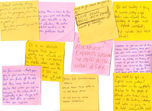You Tube has some great videos for listening practice!
What I really like about this story is that foreign university students in London set up the project.
And the result was so simple, but it completely changed the lives of people in Rwanda, Africa.
Watch the video and see how much you can generally understand - you don't need to focus on every word as the pictures are very helpful.
Listening for details
In class we focus on listening to understand the general story, and listening for specific information.
Sometimes it helps to listen very carefully to every word and try to write down what you hear. So this is what you are going to do in these activities.
Activity A - First of all play the recording below to listen to these sentences, and decide which you hear first - a or b. You may need to listen several times to check you have the correct answer.
1. a) She's made it. b) She made it.
2. a) He'd started it. b) He started it.
3. a) You're taught it. b) You taught it.
4. a) I've lost it. b) I lost it.
5. a) We'll watch it. b) We watch it.
6. a) I won't buy it. b) I want to buy it.
Activity B - Now play the recording below to listen to some different sentences, and write down what you can hear. You will hear each sentence twice. However, you may need to listen several times to help you write down all the words.
Click here to check all your answers.If you think this helps your listening, why don't you record some speaking from the TV or internet videos (news programs are good) and try to write down everything. It doesn't matter if you don't understand every word because you can still guess the general meaning. It will also help you to learn new words.
Post-it Note Vocabulary for IC1

Post-it Notes!
Each week you should try to learn about 10 new words...and REMEMBER them!!!
The best way to do this is to write them on post-it notes and post them round your house. For example, one on the fridge, one on your bedroom door, one on the mirror, one next to your bed etc.
What should you write on the post-it?
Remember in class I wrote a personal sentence that was real.
Last weekend I persuaded my husband to try Chinese food.
This shows the verb I want to learn - persuade
It also shows how to use it in a sentence - verb + obj.+ to + verb
Every time you see the post-it note you MUST READ everything on it. So, if you see the post-it note 10 times everyday for 7 days, that means you say this new word 70 times in one week!
This repetition creates a little 'pathway' or road in your brain, and this means the new word has become part of your English knowledge in your brain.
However, like all roads, this must be looked after and 'maintained'. This means you should try to use this word when you speak in class or when you do your homework.
If you don't use the word then, unfortunately, your 'word pathway' will break down. And this is what happens to some roads in Istanbul when they are not maintained!!



 RSS Feed
RSS Feed